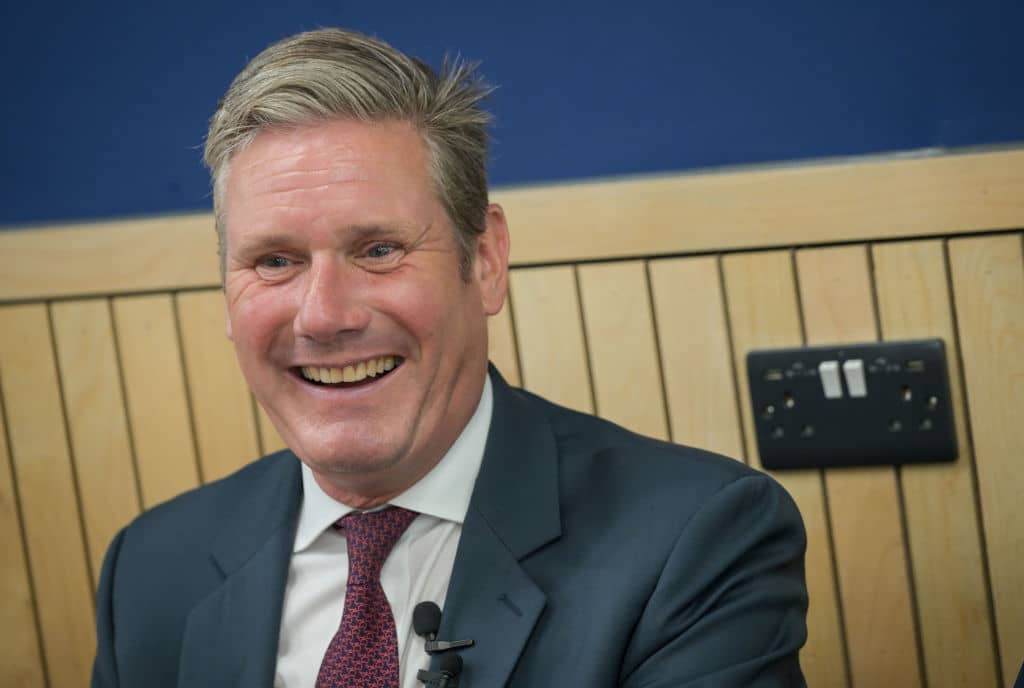No one thinks of the careful, polite Keir Starmer as a populist hero. But his intervention in the fuel crisis is a classic example of a barnstorming populist intervention that pushes aside complexity and forces a complacent elite to think again.
The fuel cap must be frozen at today’s level until March 2023, Labour says. Everyone’s fuel cap, that is, without exception. No clever pointy-headed schemes to target help at this group of energy consumers but not at that. Just a big, bold, simple policy that Labour politicians can explain in a sentence.
Biff, Bash, Boff, the Starmster gets it sorted.
Labour believes Liz Truss has walked into a trap of her own making. ‘She’s concentrated on tax cuts, the priority of Tory members, not on the cost of living, the priorities of the electorate,’ one of Starmer’s aides said.
So she has, and appealed to her own right-wing prejudices as well. But the mistakes of the presumptive leader of the Tory party do not on the face of it justify Labour calling for an extraordinarily expensive subsidy for every household in the country, including households that do not need it.
Simplistic? Certainly. Crude? Undoubtedly. Effective? You’d better believe it
With Putin undefeated in Ukraine, there’s no guarantee that prices will fall in March. Nothing lasts as long as a temporary measure, and no one can know for how many more months Labour would need to pay billions to keep the average energy price cap at £1971.
The economic case for Labour is that its plan is costed. Labour will pay for emergency aid in part by extending the windfall tax on oil and gas firms, which are benefitting from unearned profits. The social case is that it is not just the poor who will suffer this winter.
You have to be properly rich to view with equanimity a rise in average fuel bills from £1971 now to £4000 or more in January. The chief executive of E.ON predicts that 40 per cent of households will be in fuel poverty – that is, they will be spending more, sometimes much more, than 10 per cent of their income on energy costs.
Beyond them are millions of others who won’t be in poverty but will still be struggling. A YouGov poll for the Times found that only one in eight of those surveyed believed they could meet rising energy bills without reducing their standard of living. Helping the other seven is not a self-evident extravagance, particularly when real wages are falling at a record rate.
Targeting public aid on those who need it sounds attractive. But the argument for universal benefits has always been that means-testing imposes so many bureaucratic costs and necessitates so many arbitrary cut off points that it is simpler and cleaner to help everyone.
Concern for those who will suffer and are already suffering must come first. After that come the inevitable political considerations.
The Labour front bench believes voters view arguments for targeting benefits with suspicion. Even people who will eventually receive help think that ‘the money will go to someone else, not to me’.
And then there is, from a centre-left perspective, the idiocy of the Truss campaign. Truss and Kwasi Kwarteng, her likely chancellor, are giving every indication that they oppose threatening energy companies with a larger windfall tax. Leave aside the arguments in favour of making monopoly controllers of a scarce resource pay, and ask whether the Conservatives believe voters will respond well to politicians determined to defend the unearned wealth of fuel companies.
And when I say ‘voters’ I mean the tens of millions who will vote at the next election, not the 150,000 or so members of the Conservative party, who, like spoiled children, receive more attention than is good for them – or, come to that, for the rest of us. Come September the broader electorate will be confronted with a Conservative party that will sound as if it is in the pockets of profiteers.
Truss’s own position remains frighteningly complacent. Political reporters say that she has ‘rowed back’ from her statement to the Financial Times on 5 August that she opposed ‘handouts’ to the needy. If she has, she hasn’t rowed far.
‘My priority is reducing taxes so people can keep more of their own money,’ she told Sky News yesterday, even though tax cuts will bring little or no relief to those most in need. She rejected ‘sticking plaster’ solutions, she continued, and her next step would be ‘to boost energy supply’.
This was an incredible statement, and not only because sticking plaster solutions are exactly what you need when you are bleeding. Boosting energy supply is the work of years. The Conservatives have been in power since 2010 and have failed to do it. As for Truss, she has spent the summer stomping the shires and assuring the Conservative party’s spoiled children that on no account will she allow wind and solar farms to blight their pretty views.
The best her confused campaign can imply is that there will be targeted support. Consider how easy it will be to attack her when she becomes prime minister.
Labour will respond to the confusion and bureaucratic complexity and expense of targeting with a clear statement that the energy cap must be frozen now.
Simplistic? Certainly. Crude? Undoubtedly. Effective? You’d better believe it. Already the polls are showing overwhelming support for Labour’s position and the public is responding to Sir Keir Starmer, the world’s most unlikely populist.







Comments